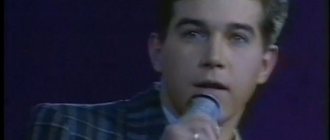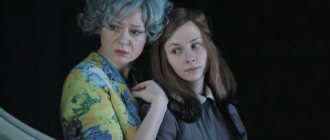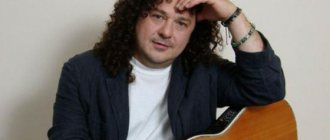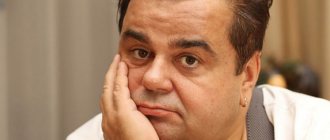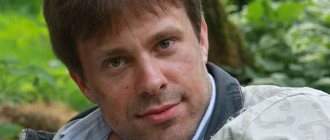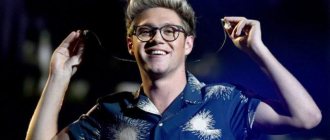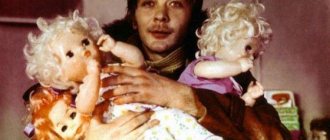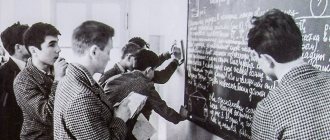Wikipedia has articles about other people with this surname, see Krylov; Krylov, Sergei.
| Sergei Lvovich Krylov | |
| basic information | |
| Date of Birth | August 25, 1961(1961-08-25) (age 57) |
| Place of Birth | Tula |
| A country | USSR USSR → Russia Russia |
| Professions | singer, actor, TV presenter, showman |
| krylovsergey.ru | |
| Audio, photo, video on Wikimedia Commons | |
Sergei Lvovich Krylov
(born August 25, 1961, Tula) is a Russian singer, showman and actor, head of the organization “Union of Children of Russia”, vice-president of the World Charitable Organization of Professional Fashionable Sex Theorists[1].
Biography
Born in the city of Tula on August 25, 1961.
Father - Lev Alekseevich Krylov (06/09/1938-1984), mother - Valentina Ilyinichna Tarkhanova (maiden name Sakharova)[2] (12/1/1941-7/2004) together with stepfather - Alexei Dmitrievich Chvanov (1926-2004) were killed by robbers on July 10 2004 in Tula[3]. My mother worked at a weapons factory all her life. Stepfather Alexey Dmitrievich Chvanov loved Sergei more than his own son, he was a war veteran, Sergei helped him with surgery for throat cancer[4][5].
In 1977 he graduated from music school.
in 1978 he graduated from secondary school No. 49 in Tula[1].
In 1981-1985 he studied at the Yaroslavl Theater Institute.
Since 1986, he was a member of the all-Union studio SPM “Record” (Moscow)
In March 1987, he recorded a solo album of 11 songs called “The Illusion of Life.”
The first performance as a showman took place on April 1, 1987 at the celebration of April Fool's Day; in October he made his debut television broadcast on Morning Mail with the Black Sea. At the same time, Krylov began to appear in a number of youth television programs, such as “50/50”, “Marathon-15”, etc.
In 1991, together with Valery Leontiev and his group “Echo”, he traveled to India and filmed the concert film “Made in India”.
In 1992, Krylov starred as Ostap Bender in Vasily Pichul’s film “Dreams of an Idiot.”
From 1992 to 1994, he was the host of the “Night Channel Dream-Vision” program.
In 1993, the song “Autumn - Golden Leaves” (in a duet with Alexander Dobronravov) was a resounding success with the public.
In 1994, the “Angel-421” project was carried out, within the framework of which Krylov acted as an intermediary between the sponsor and the representative of Russia (Masha Katz - Judith) at the 39th Eurovision Song Contest in Dublin, reimbursing the sponsor for expenses in the amount of $100,000 from personal funds[6 ], and also recorded an album with songs by Alexander Dobronravov with poems by Victor Pelenyagre.
The show "Angel-421" was shown in Samara, Tula, Saratov, Tolyatti.
At the beginning of 1994, the album “Port Said” was released with the best hits from 1988 to 1993. Based on sales results, the disc became “gold”. In November 1995, Krylov gave a solo concert at the Manhattan Center Studio concert hall in New York.
In December 1996 - January 1997, he recorded the album “Monsieur Vysotsky, come back to us,” dedicated to the 60th anniversary of the birth of Vladimir Vysotsky. The album contains 12 songs. They are written in the style of urban romance. One of them is a song by Vladimir Vysotsky. The cult Kharkov group “Different People” took part in the recording of the album.
In 2008, the management of the Sochi Winter Theater invited Sergei Krylov to create a theatrical performance based on the film “The Diamond Arm”. The singer agreed[7]. Famous actors were supposed to participate in the production - for example, Pavel Volya was supposed to play the smuggler Gesha Kozodoev (Andrei Mironov played this role in the film). However, due to the financial crisis, this project was postponed indefinitely[8]. Krylov himself planned to play Lelik (the character of Anatoly Papanov) there, however, according to him, he would gladly share this role “if one of his star colleagues wants to play this hero”[7].
Participated in the reality show “The Last Hero”[9] and the program “You are a superstar!”
On November 9, 2020, the premiere of Alexander Dobronravov’s video “Angel, 333” (Angel Attached to the Earth), which was recorded with the participation of a string quartet to the poems of Sergei Krylov, took place. The director of the video was Anton Dorin. Video on YouTube The song was included in Alexander Dobronravov’s album “Unexpectedly-Unexpectedly”.
Sergei Krylov: biography
Sergei Krylov is a singer and actor, showman and TV presenter.
Everyone knows his songs, they sing and sing along. There must be many good people. So I always want to listen to Sergei Lvovich. Tula summer day, a boy was born. Mom worked at a weapons factory. The place of his own father, Lev Alekseevich Krylov, was taken by his stepfather Alexey Tarkhanov, who was more than a friend to the boy. In 2004, overnight, neither my mother nor my stepfather died.
They were killed by criminals when they entered their apartment. The woman was 63 years old, the man was 15 years older. Later, the loving son will dedicate one of his songs to his mother. Sergei started speaking at the age of 3, but singing earlier, that’s what he always thought.
Joseph Kobzon's playful song about a girl who, for some reason, was constantly being watched by a guy, served as the beginning of the creative biography of the future artist. The boy studied vocals and musical notation at a music school, where he never missed a lesson. Sergei Krylov grew up as a sociable and confident boy, and later he learned to please girls with the same ease.
Personal life
- First wife Larisa Makarova (marriage 1.5 years) (born March 15, 1960) [1] - marriage concluded [Indicate when]; stopped [ how?
] [Specify when]. daughter Carolina Krylova (born January 31, 1980)[10],
- son Yan Krylov (born November 5, 1992)[1].
| This section is not completed. You will help the project by correcting and expanding it. |
Krylov Stepan Ivanovich
Krylov Stepan Ivanovich Honored Artist of the RSFSR (1969) Born on February 14, 1910. Died on February 28, 1998.
Stepan Krylov was born in the village of Gorodok, Vyazemsky district, Smolensk province, into a peasant family. His father worked as a locomotive fireman on the railway at the Vyazma station depot from 1914 to 1924, then retired due to old age and was engaged in farming (died in 1942). His mother was a housewife (died in 1938), on whose shoulders lay all the cares of the house and raising five children.
After graduating from six classes of the railway school, Stepan went to his sister in Leningrad, where he got a job in the shoe workshops of the private shoemaker Artamonov. After six months of working for him, he switched to a butter factory and worked there until the summer of 1927. Then he returned to Vyazma and became a worker repairing telegraph lines. In 1929, he again left for Leningrad, finding a job as a kitchen worker and storekeeper in the canteen of the Clara Zetkin tobacco factory. In 1931, Krylov entered the acting department of the Leningrad College of Performing Arts, from which he graduated in 1935.
From 1939 to 1942, Stepan Krylov was an actor at the Leningrad New Theater. From the beginning of the Great Patriotic War until March 1942, he was in blockaded Leningrad. Then, together with the theater, he was evacuated to Pyatigorsk, and from there, in August, in connection with the offensive of German troops, he was transported to the North Caucasus.
In October 1942, finding himself with his family in Central Asia, in Tashkent, Stepan Krylov was accepted into the Tashkent Theater of the Red Army of the Central Asian Military District. In 1945, haunted by attacks of malaria, on the recommendation of doctors, the actor returned to Leningrad and joined the acting staff of the Lenfilm film studio. In connection with its abolition, from 1949 to 1957 he worked in Moscow at the Film Actor's Studio Theater. He played in the plays: “Children of Vanyushin” by S.A. Naidenova (Krasavin), “Breakfast at the Leader” by I.S. Krylova (Alupkin), “Three Soldiers” by Yu.P. Egorova and G.S. Pobedonostseva (Shapovalov), “Sofia Kovalevskaya” Br. Tour (Zybin), “Poverty is not a vice” by A.N. Ostrovsky (Gordey Karpych Tortsov), “The Jumper” by A.P. Chekhov (Zhmukhin), “Angelo” by V. Hugo (Gaboardo), “Mandate” by N.R. Erdman (organ grinder). In 1957, when the theater was closed, Krylov returned to Leningrad and subsequently served in the Film Actor's Studio at the Lenfilm film studio.
Stepan Krylov made his film debut in 1932 as a young worker in “Counter”. The actor's main role was simple Russian men, workers and military men, who turned out to be very colorful and convincing. Among his best works: Zhurba (“Thirteen”), Subbotin (“Komsomolsk”), Major Rudoy (“Two Soldiers”), Budkov (“For Those at Sea”), Sergeant Major Korkin (“Happy Sailing”), Miron (“Alien Relatives”), Father Alimpy (“Anathema”), Kondratyev (“Resurrection”), Katasonov (“Ivan’s Childhood”), Donat (“The Trial”), foundry master (“Andrei Rublev”), Gordeev (“Theirs”) knew only by sight"), Murash ("Snow Maiden"), miller Kudilin ("Five from the Sky"), Fesenko ("Night Motorcyclist"), Yakov ("Cliff").
In 1939, Stepan Ivanovich got married. His wife Evgenia Ivanovna was a dressmaker in her youth, and after the birth of two daughters Ksenia and Alexandra, she was a housewife (she died in 1980). Both daughters subsequently worked in a design organization. Stepan Ivanovich also raised his wife’s son from his first marriage.
Stepan Krylov was a very modest person and led a secluded life. He did not tolerate injustice, he always stood up for the weak. He loved nature and grew plants. When I was sick, I preferred to be treated with folk remedies. He had literary talent - he wrote poetry and scripts. Concerted with concert crews. Among his friends were Pavel Kadochnikov and Alexander Susnin. He was a strict father and taught his children to be orderly. Loved his four grandchildren.
At the end of his life, doctors diagnosed Stepan Ivanovich with oncology. He endured the disease very steadfastly, never complaining to anyone about his health. Died at the age of 88. He was buried in the Southern Cemetery of St. Petersburg.
Films and roles:
1932: “Counter” (worker); 1933: “My Motherland” (Red Army soldier); 1934: “Thunderstorm” (clerk), “Do I love you?” (ep); 1935: “Girlfriends” (armored train driver), “The Path of the Ship” (radio operator); 1936: “Thirteen” (Zhurba); 1937: “For the Soviet Motherland” (Red Army soldier); 1938: “Komsomolsk” (Subbotin), “On the Border” (Anton and the White Guard), “Eleventh of July” (soldier); 1939: “We are no happier” (driver Vasya), “Transition” (chief of the outpost), “Soviet Patriots” (fighter Okhrimenko), “Tankmen” (radio operator); 1940: “Tanker “Derbent” (sailor from “Agamali”); 1941: “BKS No. 2. One of many” (pilot), “The Janusz Family” (Ostap), “Front-line girlfriends” (soldier); 1942: “Defense of Tsaritsyn” (comrade from Moscow); 1943: “Two Fighters” (Major Rudoy); 1946: “Nameless Island” (navigator); 1947: “For those at sea” (Budkov); 1949: “Alexander Popov” (installing the mast), “Konstantin Zaslonov” (worker), “Happy sailing” (Foreman Korkin); 1950: “Far from Moscow” (Solntsev), “Cavalier of the Golden Star” (Rodnikovets); 1951: “The Country Doctor” (ep.); 1952: “Composer Glinka” (Stepan); 1953: “Freeloader” (Karpachev); 1954: “Heroes of Shipka” (soldier); 1955: “Alien Relatives” (Miron Ivanovich); 1956: “Seekers” (worker), “Polyushko-field” (soldier), “The Adventures of Artemka” (bearded man); 1957: “Coordinates unknown” (Stepanych), “The sailor went ashore” (Korobov), “Eaglet” (sailor Galushka); 1958: “Andreyka” (soldier), “In the Days of October” (soldier), “The House Opposite”, film (Mamochkin); 1959: “Life is in your hands” (member of the city committee), “Golden Echelon” (Nikanor Ivanovich), “Liberal”, k/m (official), “Don’t have a hundred rubles” (Apukhtin); 1960: “Anathema”, film (Father Alimpy), “Baltic Sky” (sailor Sharapov), “Home” (worker), “Guys from Kanonersky” (driver), “Someone else’s misfortune” (collective farmer); 1961: “Resurrection”, 2nd series (Kondratiev, political prisoner), “Peace to him who enters” (Lieutenant Colonel Chernyaev); 1962: “Ivan’s Childhood” (Katasonov), “The Court” (Donat); 1963: “The Return of Veronica” (Mikhalych), “Wait for us at dawn” (commissioner), “Collecting clouds”, film (janitor); 1964: “Wagtail Army” (soldier), “State Criminal” (Vasily Ivanovich), “Zero Three” (worker), “Last Night in Paradise” (Maxim); 1965: “Death of the squadron” (first Baltic), “Hyperboloid of engineer Garin” (telegraph worker), “Musicians of one regiment” (Schapin), “The Southern Cross above us” (Rudenko); 1966: “Andrei Rublev” (Peter, foundry master), “In the city of S.” (Sinyukhin), “They were known only by sight” (Gordeev, leader of the underground), “On the wild coast” (Oles Poperechny), “Alone with the night” (ep.), “Chief of Chukotka” (chekist); 1967: “Where the Winter is Long” (Vinichek), “Quiet Odessa” (Sinesvitenko), “Four Pages of One Young Life” (Sasha’s Neighbor); 1968: “Dead Season” (former prisoner), “On the Road”, TV, film (Nikolai Ivanovich), “Case from investigative practice” (ep.), “Snow Maiden” (Murash); 1969: “White Explosion” (commissioner), “White Weathervane” (man), “On the Way to Berlin” (member of the Military Council), “Five from the Sky” (miller Kudilin); 1970: “Call the hurricane “Maria””, TV (captain), “Sevastopol” (sailor); 1971: “Yesterday, Today and Always” (Korobeinikov), “City under the Linden Trees” (General Debeltsev), “Sea of Our Hope” (gray-haired captain), “Mortal Enemy” (cell secretary), “The White Queen’s Move” (Nikolai Ivanovich ); 1972: “Ivanov’s boat” (Korney Ivanovich), “Karpukhin” (Nikonov’s father), “Night motorcyclist” (Fesenko, postmaster), “Before the first snow” (Andrey Yegorovich); 1973: “Big Springboard” (Nikitich), “Returned Year” (ep.); 1974: “Parcel for Svetlana”, TV (driver); 1975: “Following my course” (soldier), “Dream”, TV (Polukhin); 1976: “Waves of the Black Sea”, TV (janitor), “Everyone knows Kadkin” (conductor), “Trainee” (veteran); 1977: "Funny people!" (singing), “Front behind the front line” (old soldier), “Chopin, sonata No. 2”, film (Polosukhin); 1977-1979: “Open Book”, TV (vehicle depot director); 1978: “Trace on the Earth” (ep.), “Dawns Kiss” (old man with ice cream); 1979: “Cossack Robbers” (Uncle Mitya); 1980: “At the beginning of glorious deeds” (a man in a tavern); 1981: “For no apparent reason” (railroad worker), “Black Triangle”, TV (priest); 1983: “Cliff” (Yakov); 1984: “Dead Souls”, TV (man); 1985: “Meet me in the subway” (firefighter); 1986: “I Believe in Love” (ep.); 1987: “Kreutzer Sonata” (Egor).
Discography
- 1987 - “The Illusion of Life.”
- 1988 - magnetic album “Sea”[1]
- 1993 — “Port Said”
- 1994 — “Angel 421”[1]
- 1994 — “Excel-moksel” (album of children's songs)[1]
- 1997 - “Monsieur Vysotsky, come back to us”[1]
- 2003 — “Everything is fine”[1]
Songs
- “Hello, Alla Borisovna”
- "Australia"
- “Agent 004” (music by A. Dobronravov)
- “English Young Ladies” (music by A. Dobronravov)
- “In the distant Bay of Bascay” (music by A. Dobronravov)
- “In a hangout in Kathmandu” (music by A. Dobronravov)
- “The Month of May” (music by A. Dobronravov)
- “Sea” (music by S. Krylov)
- “On the Hawaiian Islands” (music by A. Dobronravov)
- “Autumn - golden leaf fall” (duet with Alexander Dobronravov) (music by A. Dobronravov)
- “Bright Angel” (music by A. Dobronravov)
- “Forty-second Street” (music by A. Dobronravov)
- “A stewardess named Zhanna - 2” (music by A. Dobronravov)
- “Jester” (music by A. Dobronravov)
- "Georgian rap"
- "My girl"
- “Not long ago you were with me”
- "Winter Song"
- “In short, I’m calling from Sochi”
- "Where does the smoke go"
- "New Year"
- "Easter"
- “I want to be with you...”
- "Ball"
- "Parrot"
- “Black Sea” (performed by V. Leontyev)
- “Ostankino Tower” (performed by V. Leontyev)
- “Spy” (performed by V. Leontyev)
Excerpt characterizing Krylov, Sergey Lvovich
“I do not want and did not want war,” he said, “but I was forced into it.” Even now (he said this word with emphasis) I am ready to accept all the explanations that you can give me. - And he clearly and briefly began to state the reasons for his displeasure against the Russian government. Judging by the moderately calm and friendly tone with which the French emperor spoke, Balashev was firmly convinced that he wanted peace and intended to enter into negotiations. - Sire! L'Empereur, mon maitre, [Your Majesty! Emperor, my lord,] - Balashev began a long-prepared speech when Napoleon, having finished his speech, looked questioningly at the Russian ambassador; but the look of the emperor's eyes fixed on him confused him. “You are embarrassed - come to your senses,” Napoleon seemed to say, looking at Balashev’s uniform and sword with a barely noticeable smile. Balashev recovered and began to speak. He said that Emperor Alexander did not consider Kurakin’s demand for passports to be a sufficient reason for war, that Kurakin did so arbitrarily and without the consent of the sovereign, that Emperor Alexander did not want war and that there were no relations with England. “Not yet,” Napoleon interjected and, as if afraid to give in to his feelings, he frowned and nodded his head slightly, thereby letting Balashev feel that he could continue. Having expressed everything that was ordered to him, Balashev said that Emperor Alexander wants peace, but will not begin negotiations except on the condition that... Here Balashev hesitated: he remembered those words that Emperor Alexander did not write in the letter, but which he certainly ordered that Saltykov be inserted into the rescript and which Balashev ordered to hand over to Napoleon. Balashev remembered these words: “until not a single armed enemy remains on Russian land,” but some complex feeling held him back. He could not say these words, although he wanted to do so. He hesitated and said: on the condition that the French troops retreat beyond the Neman. Napoleon noticed Balashev's embarrassment when uttering his last words; his face trembled, his left calf began to tremble rhythmically. Without leaving his place, he began to speak in a voice higher and more hasty than before. During the subsequent speech, Balashev, more than once lowering his eyes, involuntarily observed the trembling of the calf in Napoleon’s left leg, which intensified the more he raised his voice. “I wish peace no less than Emperor Alexander,” he began. “Isn’t it me who has been doing everything for eighteen months to get it?” I've been waiting eighteen months for an explanation. But in order to start negotiations, what is required of me? - he said, frowning and making an energetic questioning gesture with his small, white and plump hand. “The retreat of the troops beyond the Neman, sir,” said Balashev. - For Neman? - Napoleon repeated. - So now you want them to retreat beyond the Neman - only beyond the Neman? – Napoleon repeated, looking directly at Balashev. Balashev bowed his head respectfully. Instead of the demand four months ago to retreat from Numberania, now they demanded to retreat only beyond the Neman. Napoleon quickly turned and began to walk around the room. – You say that they require me to retreat beyond the Neman to begin negotiations; but they demanded of me in exactly the same way two months ago to retreat beyond the Oder and Vistula, and, despite this, you agree to negotiate. He silently walked from one corner of the room to the other and again stopped opposite Balashev. His face seemed to harden in its stern expression, and his left leg trembled even faster than before. Napoleon knew this trembling of his left calf. “La vibration de mon mollet gauche est un grand signe chez moi,” he said later. “Such proposals as clearing the Oder and the Vistula can be made to the Prince of Baden, and not to me,” Napoleon almost cried out, completely unexpectedly for himself. – If you had given me St. Petersburg and Moscow, I would not have accepted these conditions. Are you saying I started the war? Who came to the army first? - Emperor Alexander, not me. And you offer me negotiations when I have spent millions, while you are in an alliance with England and when your position is bad - you offer me negotiations! What is the purpose of your alliance with England? What did she give you? - he said hastily, obviously already directing his speech not in order to express the benefits of concluding peace and discussing its possibility, but only in order to prove both his rightness and his strength, and to prove Alexander’s wrongness and mistakes. The introduction of his speech was made, obviously, with the aim of showing the advantage of his position and showing that, despite the fact, he accepted the opening of negotiations. But he had already begun to speak, and the more he spoke, the less able he was to control his speech. The whole purpose of his speech now, obviously, was only to exalt himself and insult Alexander, that is, to do exactly what he least wanted at the beginning of the date. - They say you made peace with the Turks? Balashev tilted his head affirmatively. “The world is concluded...” he began. But Napoleon did not let him speak. He apparently needed to speak on his own, alone, and he continued to speak with that eloquence and intemperance of irritation to which spoiled people are so prone. – Yes, I know, you made peace with the Turks without receiving Moldavia and Wallachia. And I would give these provinces to your sovereign just as I gave him Finland. Yes,” he continued, “I promised and would have given Moldavia and Wallachia to Emperor Alexander, but now he will not have these beautiful provinces.” He could, however, annex them to his empire, and in one reign he would expand Russia from the Gulf of Bothnia to the mouth of the Danube. “Katherine the Great could not have done more,” said Napoleon, becoming more and more excited, walking around the room and repeating to Balashev almost the same words that he said to Alexander himself in Tilsit. – Tout cela il l'aurait du a mon amitie... Ah! quel beau regne, quel beau regne! - he repeated several times, stopped, took a golden snuffbox out of his pocket and greedily sniffed from it. – Quel beau regne aurait pu etre celui de l'Empereur Alexandre! [He would owe all this to my friendship... Oh, what a wonderful reign, what a wonderful reign! Oh, what a wonderful reign the reign of Emperor Alexander could have been!] He looked at Balashev with regret, and just as Balashev wanted to notice something, he again hastily interrupted him. “What could he want and seek that he would not find in my friendship?..” said Napoleon, shrugging his shoulders in bewilderment. - No, he found it best to surround himself with my enemies, and who? - he continued. - He called to him the Steins, Armfelds, Wintzingerode, Bennigsenov, Stein - a traitor driven out of his fatherland, Armfeld - a libertine and intriguer, Wintzingerode - a fugitive subject of France, Bennigsen somewhat more military than the others, but still incapable, who could not do anything to do in 1807 and which should awaken terrible memories in Emperor Alexander... Let’s suppose, if they were capable, they could be used,” continued Napoleon, barely managing to keep up with the words that constantly arise, showing him his rightness or strength (which in in his concept were one and the same) - but even that is not the case: they are not suitable for either war or peace. Barclay, they say, is more efficient than all of them; but I won’t say that, judging by his first movements. What are they doing? What are all these courtiers doing! Pfuhl proposes, Armfeld argues, Bennigsen considers, and Barclay, called to act, does not know what to decide on, and time passes. One Bagration is a military man. He is stupid, but he has experience, an eye and determination... And what role does your young sovereign play in this ugly crowd. They compromise him and blame him for everything that happens. “Un souverain ne doit etre a l'armee que quand il est general, [The sovereign should be with the army only when he is a commander,” he said, obviously sending these words directly as a challenge to the sovereign’s face. Napoleon knew how much Emperor Alexander wanted to be a commander.
Notes
- ↑ 1234567891011
Sergei Lvovich KRYLOV biography - https://muz-news.com/page/51/
- https://www.crimea.kp.ru/daily/23320/30525/
- YELLOW PRESS :: Sergei Krylov’s mother was killed!
- INCIDENTS: Showman Sergei Krylov’s mother was killed
- I just happened to have five hundred thousand dollars, I decided to give her one hundred thousand.
- ↑ 1 2
Sergei Krylov stages “The Diamond Arm” with Pasha Volya - Rock News NEWSmusic.ru (inaccessible link -
history
). Retrieved December 19, 2011. Archived April 17, 2013. - Pavel Volya will not become Kozodoev // KP.RU - Penza
- First channel. The last hero.. Channel One. Retrieved February 5, 2014.
- ↑ 12
Artists catalog – EVENT CATALOG – Sergey Krylov
Childhood and youth
The future star of the 90s was born on August 25, 1961 in the city of Tula. Sergei Lvovich’s mother, Valentina Ilyinichna, worked at a defense industry enterprise. She worked there from the age of 18 until the end of her life. The woman divorced the boy's father.
Video course “Spring”
Landscaping for busy people, a beautiful garden without the hassle
A training course for those who want to make their dacha beautiful and prefer to spend their time, effort and money wisely.
Special offer! 50% discount! Make good use of your self-isolation!
₽ 1200.00 ₽ 600.00
MORE ❯❯❯
Sergey Krylov
Alexey Dmitrievich Tarkhanov became the head of the family and a loving father for Sergei. From Krylov’s memoirs it is known that the relationship with his stepfather was warm. Tarkhanov became an authority for Sergei.
In the summer of 2004, Russia was shocked by the news. Valentina and Alexey Tarkhanov were killed in their own apartment in Tula. At that time, the famous showman’s mother was 63 years old, and his stepfather (a war veteran) was 78.
Sergei Krylov in his youth
Since childhood, Krylov has been drawn to creativity: he was attracted to the repertoire of Joseph Kobzon. Relatives recall that Sergei hummed before he uttered the first phrase. In 1977, the future singer graduated from a music school. A year later - general education. Sergei decided to devote his life to acting and applied for admission to the theater institute in the city of Yaroslavl.
The first attempt to become a theater student was unsuccessful. But with hard work, Krylov achieved his goal; in 1981, he began studying at the institute and four years later received a diploma in “drama theater and film actor.”
